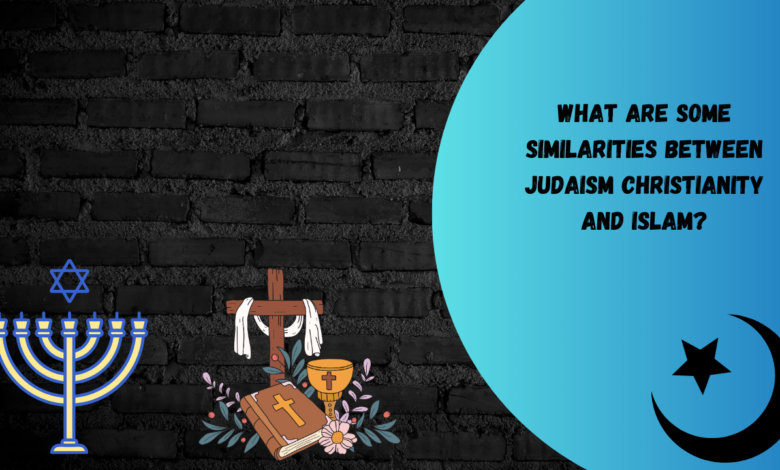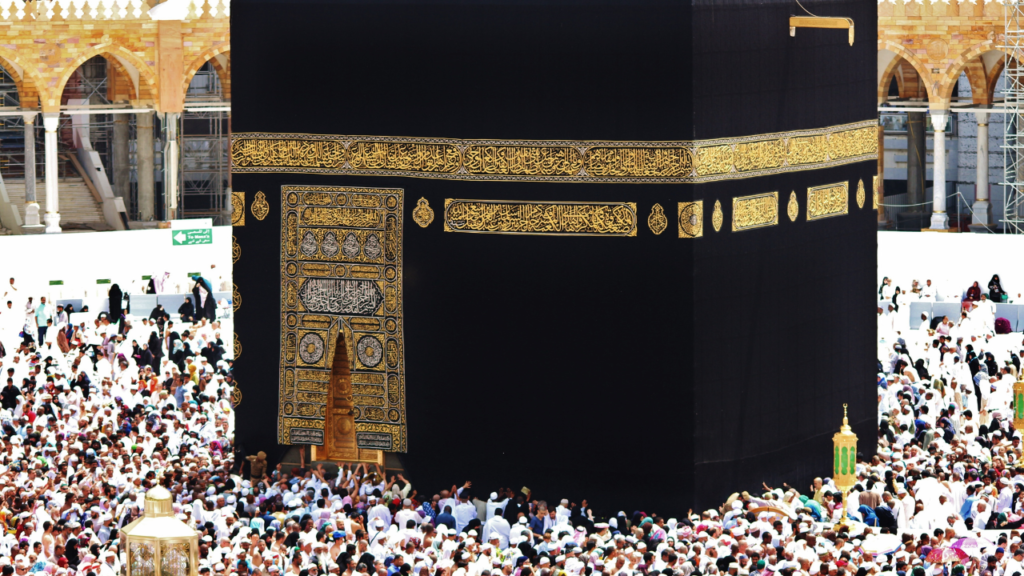What are some similarities between Judaism Christianity and Islam?
"Exploring Common Ground: Similarities Among Judaism, Christianity, and Islam"

What are some similarities between Judaism Christianity and Islam?
The Abrahamic religions refer to three major monotheistic faiths: Judaism, Christianity, and Islam. They all trace their spiritual lineage to the prophet Abraham.

Introduction
Judaism, Christianity, and Islam are three of the world’s major monotheistic religions, each with a rich history, a sacred text, and a devout following. While these faiths have distinct beliefs and practices, they also share numerous similarities that highlight their common heritage and values. In this article, we will explore some of the fundamental similarities that exist among Judaism, Christianity, and Islam, demonstrating how these shared elements contribute to a sense of unity among followers of the Abrahamic faiths.
Monotheism
Perhaps the most significant and foundational similarity among these three religions is their unwavering belief in the existence of one God, often referred to as the God of Abraham. In Judaism, this belief is encapsulated in the Shema, a central declaration of the Jewish faith: “Hear, O Israel: The Lord our God, the Lord is one” (Deuteronomy 6:4). Christians also share this monotheistic belief, acknowledging the same God, and affirming this in the Nicene Creed. Similarly, Islam asserts the oneness of Allah with the Shahada, the Islamic declaration of faith: “There is no god but Allah.”
Prophets and Scriptures
All three religions acknowledge a line of prophets who played pivotal roles in conveying God’s messages to humanity. Abraham, Moses, and David are revered figures in Judaism, while Christianity recognizes them as well and adds Jesus Christ as the central figure who fulfills the prophetic tradition. In Islam, these prophets are also respected, and Muhammad is regarded as the final prophet whose revelations are recorded in the Quran.
The sacred texts of these religions are interconnected in many ways. Judaism holds the Torah (the first five books of the Bible) as its central scripture. Christianity includes the Old Testament (which is also part of the Jewish canon) and the New Testament, with the latter detailing the life and teachings of Jesus Christ. Islam, in addition to the Quran, recognizes the Torah and the Bible as earlier divine revelations, with the Quran often referencing figures and stories from these texts.
Ethical and Moral Values
A strong emphasis on ethical and moral values is another common feature of these faiths. Concepts such as compassion, justice, kindness, and charity are highly regarded in Judaism, Christianity, and Islam. The Ten Commandments, found in the Torah, offer a moral code for Jews and are embraced by Christians as well. In Islam, the Quran provides guidance on moral conduct and social justice, emphasizing the importance of empathy and caring for others.
Worship and Prayer
All three religions involve various forms of worship and prayer. Ritual prayers are central to all of them. In Judaism, regular communal prayer takes place at the synagogue, while individual prayer can be performed at any time. In Christianity, attending church services and communal prayers are essential components of worship, and individuals also engage in personal prayer. In Islam, Muslims are required to pray five times a day facing the Kaaba in Mecca.

Also Check
- Islamic Ablution
- Islamic converts to Christianity
- Dreams interpretation in Islam
- Which Hadith do Sunnis follow?
- Similarities between Islam and Christianity
- Dua Islam
Shared Religious Practices
Certain religious practices are shared among these faiths. For example, fasting is observed during specific times in all three traditions. Jews fast on Yom Kippur, Christians during Lent, and Muslims during Ramadan. Additionally, the practice of circumcision holds significance in Judaism, is common among some Christian communities, and is also practiced in Islam.
Conclusion
While Judaism, Christianity, and Islam certainly have their differences, it is important to recognize the many similarities that bind them together. These shared beliefs in monotheism, reverence for prophets and sacred texts, ethical values, and common religious practices help foster a sense of unity among followers of the Abrahamic faiths. Understanding these common threads can promote tolerance, respect, and dialogue among people of different religious backgrounds, ultimately contributing to a more harmonious and interconnected world.

(FAQs) – Similarities between Judaism, Christianity, and Islam
What are the Abrahamic religions?
The Abrahamic religions refer to three major monotheistic faiths: Judaism, Christianity, and Islam. They all trace their spiritual lineage to the prophet Abraham.
Do these religions share common beliefs about God?
Yes, all three religions believe in the existence of one God, who is seen as the creator and sustainer of the universe.
Are there similarities in their sacred texts?
Yes, there are similarities in the sacred texts of these religions. For example, the Hebrew Bible (Old Testament) is shared between Judaism and Christianity, and both religions revere the figures of Adam, Noah, and many other biblical characters.
Do they share common moral principles?
Indeed, these religions share similar moral principles, including concepts of justice, compassion, honesty, and the importance of caring for others.
What is the role of prophets in these faiths?
All three religions acknowledge the role of prophets as messengers of God. For instance, Judaism recognizes Moses, Christianity venerates Jesus Christ, and Islam reveres prophets like Abraham, Moses, and Jesus, among others.
Do they have a shared belief in the afterlife?
Yes, there is a shared belief in the afterlife in these religions. They all believe in the concept of a final judgment and life after death, where individuals are held accountable for their actions.
Are there common religious practices among these faiths?
Rituals like prayer, fasting, and acts of charity are common across these religions. Each faith has its unique practices, but there is a shared emphasis on worship and devotion.
How do they view Jerusalem as a holy city?
Jerusalem holds significance for all three religions. In Judaism, it is the site of the ancient Temple. In Christianity, it’s where important events in Jesus’ life took place. In Islam, it’s the location of the Al-Aqsa Mosque and is associated with important events in Islamic tradition.
What is the importance of charity in these religions?
Charity is highly emphasized in all three faiths as a means of helping those in need and fulfilling a moral duty. In Islam, it’s known as “Zakat”; in Judaism, it’s “Tzedakah,” and in Christianity, it’s often referred to as “almsgiving.”
How do they view the importance of family and community?
These religions place a significant emphasis on family and community. They value strong family bonds and encourage communal support and care for one another.






